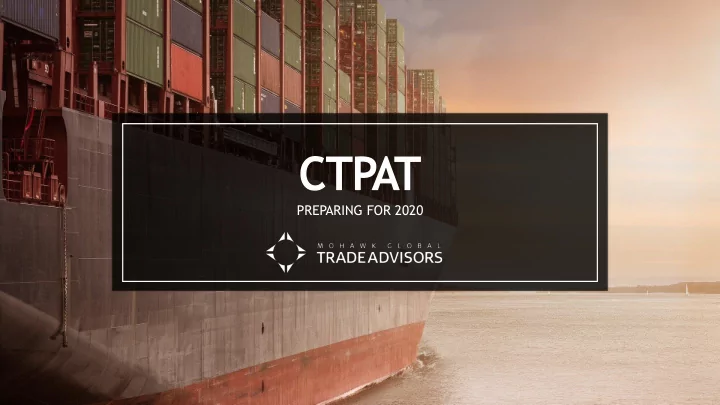

PREPARING FOR 2020
WHAT IS CTPAT? WHO CAN PARTICIPATE? BENEFITS AGENDA NEW MINIMUM SECURITY CRITERIA PREPARING FOR 2020 Q&A
WHAT IS CUSTOMS TRADE PARTNERSHIP AGAINST TERRORISM (CTPAT)? United States’ international supply chain security program. Created in 2001 in response to 9/11. Partnership between CBP and the trade community designed to protect the country’s borders and supply chain from weapons of mass destruction.
Set of criteria (MSC) designed to ensure cargo security from point of origin to place of final delivery. WHAT IS CUSTOMS Designed to prevent acts of terrorism, TRADE narcotics smuggling, human smuggling, agricultural terrorism/pest contamination, PARTNERSHIP cybersecurity attacks, money laundering, AGAINST TERRORISM and terrorist financing. (CTPAT)? By meeting criteria, companies are considered “low risk” by CBP and receive certain benefits for their participation.
U.S. importers and exporters Sea and rail carriers Licensed U.S. Customs brokers. Ocean transportation intermediaries and NVOCCs U.S./Canadian highway carriers (must cross U.S./Canadian border). WHO CAN U.S./Mexican highway carriers (must cross U.S./Mexican border). PARTICIPATE? U.S. marine port authority/terminal operators U.S. freight consolidators. Mexican and Canadian manufacturers. Mexican long-haul carriers. There are currently over 11,500 CTPAT-certified companies in the U.S.
WHAT IS CUSTOMS TRADE PARTNERSHIP AGAINST TERRORISM (CTPAT)? Different criteria depending on company type. Current MSC categories: Business partner selection and screening procedures ▪ Container security and inspection procedures ▪ Seal security ▪ ▪ Cargo discrepancy procedures ▪ Physical access controls ▪ Personnel security Documentation review and storage ▪ Training ▪ Physical security ▪ IT security ▪
1 Ensure all business partners within supply chain meet CTPAT Minimum Security Criteria 2 Creation and implementation of all required CTPAT SOPs 3 Security Profile submission in CTPAT Portal CTPAT CERTIFICATION PROCESS
CTPAT CERTIFICATION MAINTENANCE Performance of annual reviews Initial and re-validations every four years
BENEFITS Access to the Free Reduced number of Front-of-the-line Business resumption and Secure Trade inspections at the inspections (FAST) lanes at land priority U.S. port of entry borders Priority consideration at Supply Chain Access to the CTPAT Increased CBP’s Centers of Security Specialist Portal marketability Excellence and Expertise
NEW MINIMUM SECURITY CRITERIA Why now? ▪ Legally mandated ▪ Evolution of CBP’s mission ▪ Changing trade landscape ▪ The trade’s experience thus far ▪ Existence of ongoing threats
NEW MINIMUM SECURITY CRITERIA CORPORATE SECURITY TRANSPORTATION PEOPLE AND PHYSICAL SECURITY SECURITY
NEW MINIMUM SECURITY CRITERIA Cybersecurity Agricultural security Prevention of Trade Based Money Laundering and Terrorism Financing Use of Security Technology
NEW MINIMUM SECURITY CRITERIA Certain criteria strengthened from “should” to “must.”
CURRENT PARTNERS Partners will be validated against the new MSC starting on 1/1/2019
FOREIGN VALIDATIONS • CBP is required to give advance notice prior to visiting an overseas business partner for a validation. • Typically, 30 days notice is given. • Importers do not get to choose which supplier is visited: CBP makes the selection based on travel and budgetary restrictions.
MUTUAL RECOGNITION • The U.S. currently has Mutual Recognition Agreements (MRAs) in place with the following countries: • New Zealand • Canada • Jordan • Japan • Korea • European Union • Taiwan • Israel • Mexico • Singapore • Dominican Republic • Peru
CTPAT IN THE FUTURE • Will CTPAT ever become mandatory for certain commodities? • No – it is and will stay a voluntary program. • I do not believe the program will be “easier” or “harder” to participate in now that the new criteria are in place. There are additional requirements that companies must meet, but most are good business practice that companies may have already implemented solutions to on their own to deal with current threats (e.g. cybersecurity policies).
MOHAWK GLOBAL TRADE ADVISORS Abby Frank, CCS, CES 315-552-5411 afrank@mohawkglobalta.com https://mohawkglobalta.com/
Recommend
More recommend